Theoretical Approaches to Explain the Causes of War in International Relations
VerifiedAdded on 2023/06/15
|5
|1210
|488
AI Summary
This essay discusses the theoretical approaches which best explains the causes of war in international relations. The three major approaches are realism, liberalism, and constructivism. The essay compares and contrasts the three approaches and provides three empirical examples of war in the past 200 years to support the arguments.
Contribute Materials
Your contribution can guide someone’s learning journey. Share your
documents today.
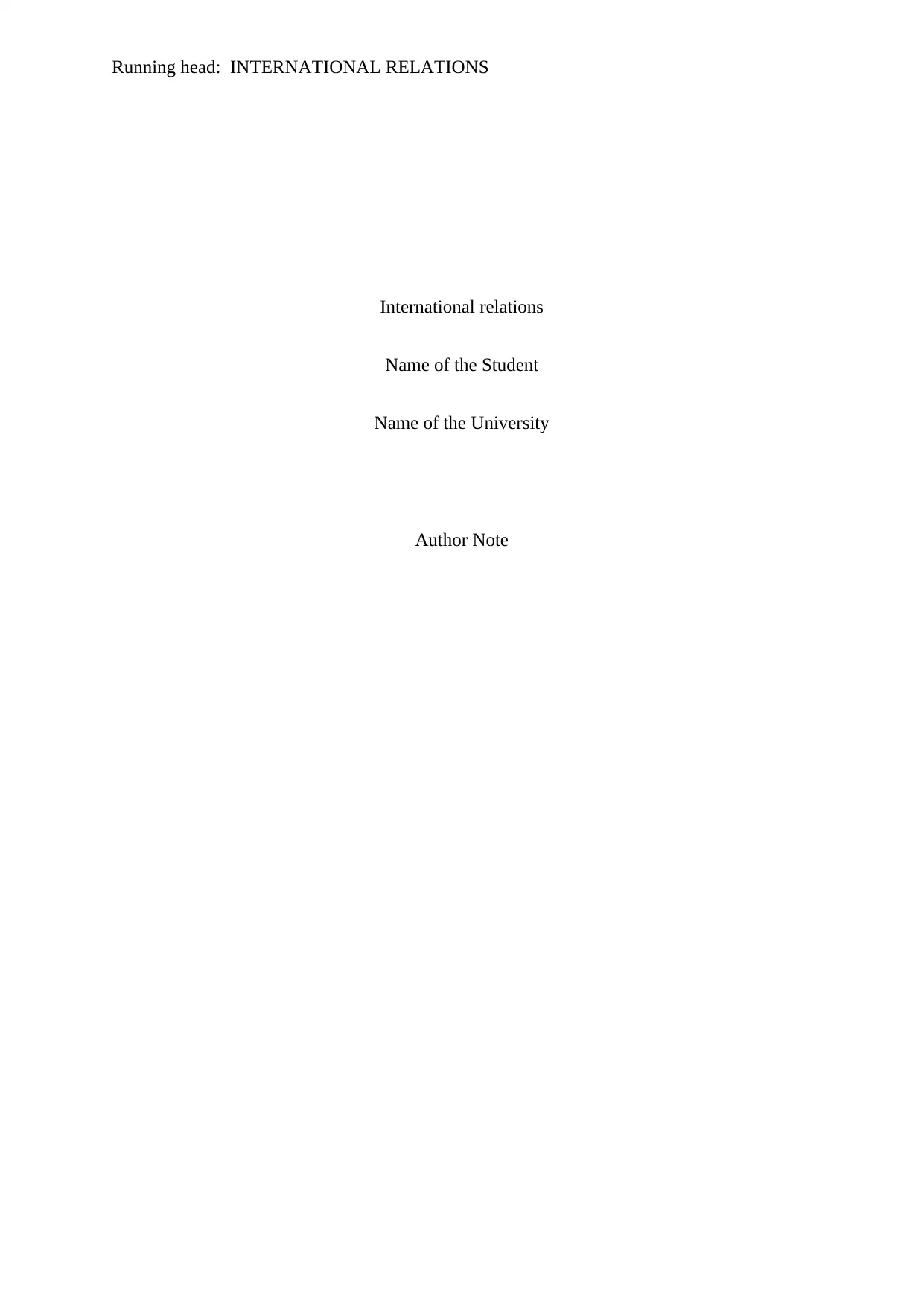
Running head: INTERNATIONAL RELATIONS
International relations
Name of the Student
Name of the University
Author Note
International relations
Name of the Student
Name of the University
Author Note
Secure Best Marks with AI Grader
Need help grading? Try our AI Grader for instant feedback on your assignments.
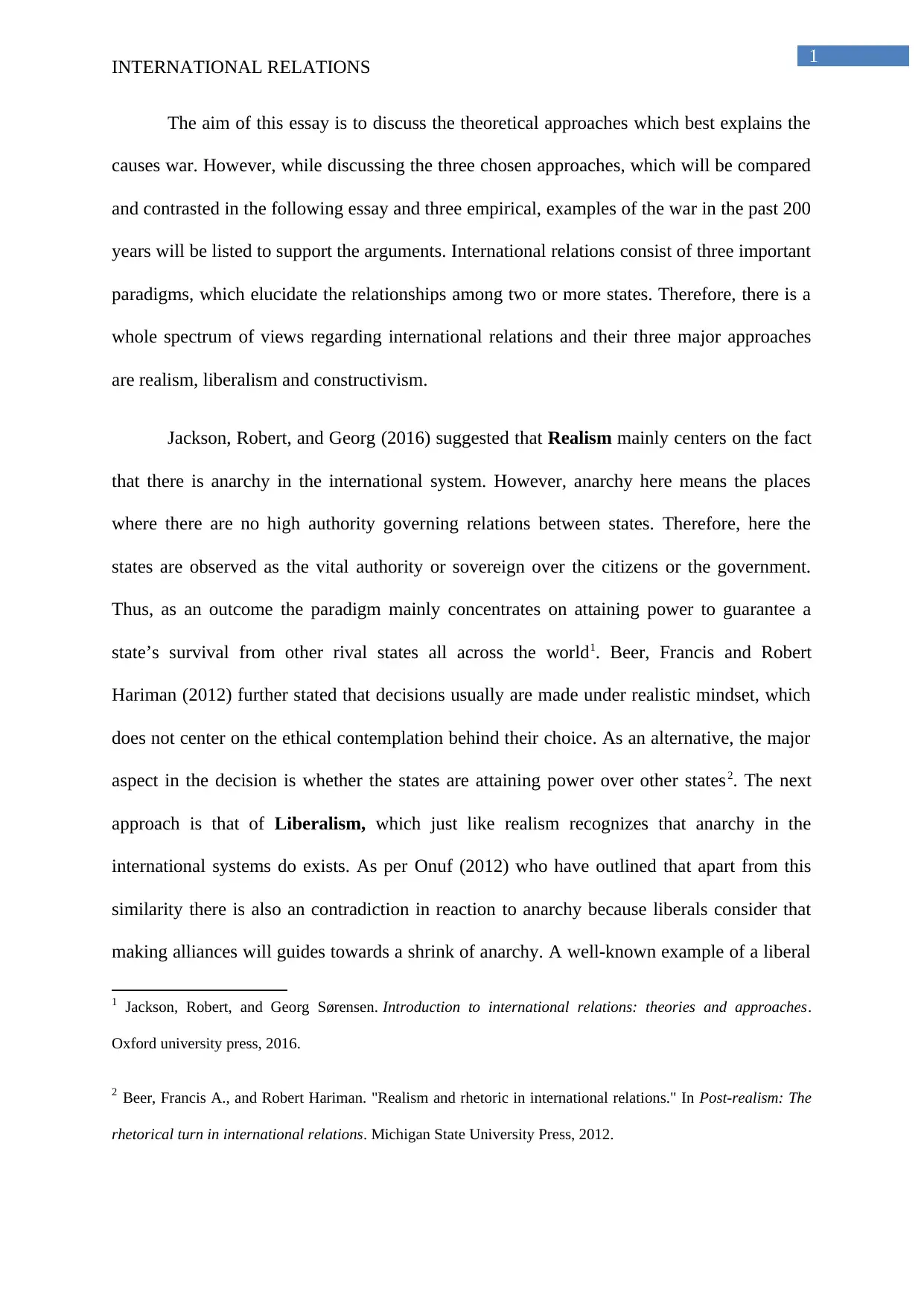
1
INTERNATIONAL RELATIONS
The aim of this essay is to discuss the theoretical approaches which best explains the
causes war. However, while discussing the three chosen approaches, which will be compared
and contrasted in the following essay and three empirical, examples of the war in the past 200
years will be listed to support the arguments. International relations consist of three important
paradigms, which elucidate the relationships among two or more states. Therefore, there is a
whole spectrum of views regarding international relations and their three major approaches
are realism, liberalism and constructivism.
Jackson, Robert, and Georg (2016) suggested that Realism mainly centers on the fact
that there is anarchy in the international system. However, anarchy here means the places
where there are no high authority governing relations between states. Therefore, here the
states are observed as the vital authority or sovereign over the citizens or the government.
Thus, as an outcome the paradigm mainly concentrates on attaining power to guarantee a
state’s survival from other rival states all across the world1. Beer, Francis and Robert
Hariman (2012) further stated that decisions usually are made under realistic mindset, which
does not center on the ethical contemplation behind their choice. As an alternative, the major
aspect in the decision is whether the states are attaining power over other states2. The next
approach is that of Liberalism, which just like realism recognizes that anarchy in the
international systems do exists. As per Onuf (2012) who have outlined that apart from this
similarity there is also an contradiction in reaction to anarchy because liberals consider that
making alliances will guides towards a shrink of anarchy. A well-known example of a liberal
1 Jackson, Robert, and Georg Sørensen. Introduction to international relations: theories and approaches.
Oxford university press, 2016.
2 Beer, Francis A., and Robert Hariman. "Realism and rhetoric in international relations." In Post-realism: The
rhetorical turn in international relations. Michigan State University Press, 2012.
INTERNATIONAL RELATIONS
The aim of this essay is to discuss the theoretical approaches which best explains the
causes war. However, while discussing the three chosen approaches, which will be compared
and contrasted in the following essay and three empirical, examples of the war in the past 200
years will be listed to support the arguments. International relations consist of three important
paradigms, which elucidate the relationships among two or more states. Therefore, there is a
whole spectrum of views regarding international relations and their three major approaches
are realism, liberalism and constructivism.
Jackson, Robert, and Georg (2016) suggested that Realism mainly centers on the fact
that there is anarchy in the international system. However, anarchy here means the places
where there are no high authority governing relations between states. Therefore, here the
states are observed as the vital authority or sovereign over the citizens or the government.
Thus, as an outcome the paradigm mainly concentrates on attaining power to guarantee a
state’s survival from other rival states all across the world1. Beer, Francis and Robert
Hariman (2012) further stated that decisions usually are made under realistic mindset, which
does not center on the ethical contemplation behind their choice. As an alternative, the major
aspect in the decision is whether the states are attaining power over other states2. The next
approach is that of Liberalism, which just like realism recognizes that anarchy in the
international systems do exists. As per Onuf (2012) who have outlined that apart from this
similarity there is also an contradiction in reaction to anarchy because liberals consider that
making alliances will guides towards a shrink of anarchy. A well-known example of a liberal
1 Jackson, Robert, and Georg Sørensen. Introduction to international relations: theories and approaches.
Oxford university press, 2016.
2 Beer, Francis A., and Robert Hariman. "Realism and rhetoric in international relations." In Post-realism: The
rhetorical turn in international relations. Michigan State University Press, 2012.
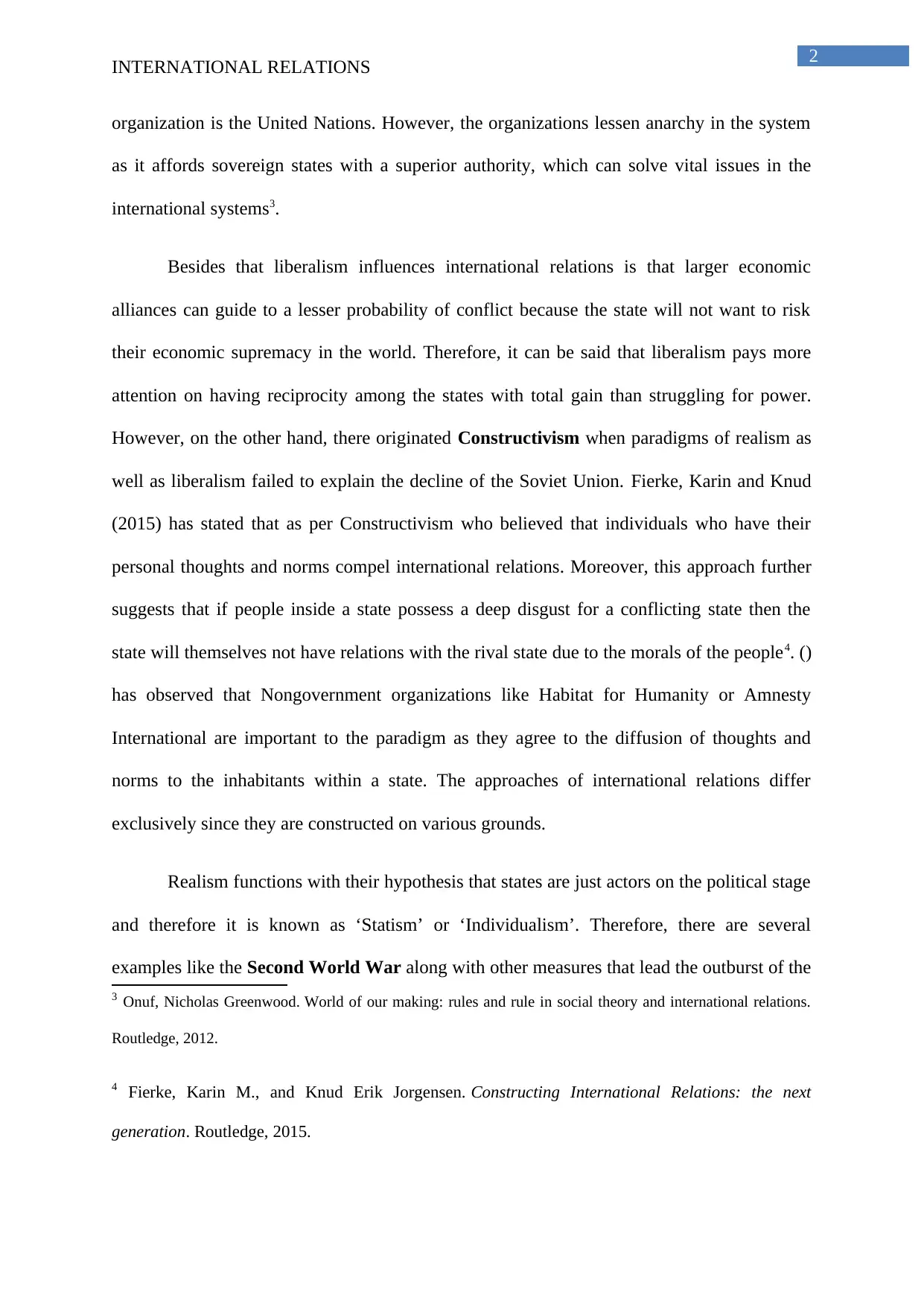
2
INTERNATIONAL RELATIONS
organization is the United Nations. However, the organizations lessen anarchy in the system
as it affords sovereign states with a superior authority, which can solve vital issues in the
international systems3.
Besides that liberalism influences international relations is that larger economic
alliances can guide to a lesser probability of conflict because the state will not want to risk
their economic supremacy in the world. Therefore, it can be said that liberalism pays more
attention on having reciprocity among the states with total gain than struggling for power.
However, on the other hand, there originated Constructivism when paradigms of realism as
well as liberalism failed to explain the decline of the Soviet Union. Fierke, Karin and Knud
(2015) has stated that as per Constructivism who believed that individuals who have their
personal thoughts and norms compel international relations. Moreover, this approach further
suggests that if people inside a state possess a deep disgust for a conflicting state then the
state will themselves not have relations with the rival state due to the morals of the people4. ()
has observed that Nongovernment organizations like Habitat for Humanity or Amnesty
International are important to the paradigm as they agree to the diffusion of thoughts and
norms to the inhabitants within a state. The approaches of international relations differ
exclusively since they are constructed on various grounds.
Realism functions with their hypothesis that states are just actors on the political stage
and therefore it is known as ‘Statism’ or ‘Individualism’. Therefore, there are several
examples like the Second World War along with other measures that lead the outburst of the
3 Onuf, Nicholas Greenwood. World of our making: rules and rule in social theory and international relations.
Routledge, 2012.
4 Fierke, Karin M., and Knud Erik Jorgensen. Constructing International Relations: the next
generation. Routledge, 2015.
INTERNATIONAL RELATIONS
organization is the United Nations. However, the organizations lessen anarchy in the system
as it affords sovereign states with a superior authority, which can solve vital issues in the
international systems3.
Besides that liberalism influences international relations is that larger economic
alliances can guide to a lesser probability of conflict because the state will not want to risk
their economic supremacy in the world. Therefore, it can be said that liberalism pays more
attention on having reciprocity among the states with total gain than struggling for power.
However, on the other hand, there originated Constructivism when paradigms of realism as
well as liberalism failed to explain the decline of the Soviet Union. Fierke, Karin and Knud
(2015) has stated that as per Constructivism who believed that individuals who have their
personal thoughts and norms compel international relations. Moreover, this approach further
suggests that if people inside a state possess a deep disgust for a conflicting state then the
state will themselves not have relations with the rival state due to the morals of the people4. ()
has observed that Nongovernment organizations like Habitat for Humanity or Amnesty
International are important to the paradigm as they agree to the diffusion of thoughts and
norms to the inhabitants within a state. The approaches of international relations differ
exclusively since they are constructed on various grounds.
Realism functions with their hypothesis that states are just actors on the political stage
and therefore it is known as ‘Statism’ or ‘Individualism’. Therefore, there are several
examples like the Second World War along with other measures that lead the outburst of the
3 Onuf, Nicholas Greenwood. World of our making: rules and rule in social theory and international relations.
Routledge, 2012.
4 Fierke, Karin M., and Knud Erik Jorgensen. Constructing International Relations: the next
generation. Routledge, 2015.
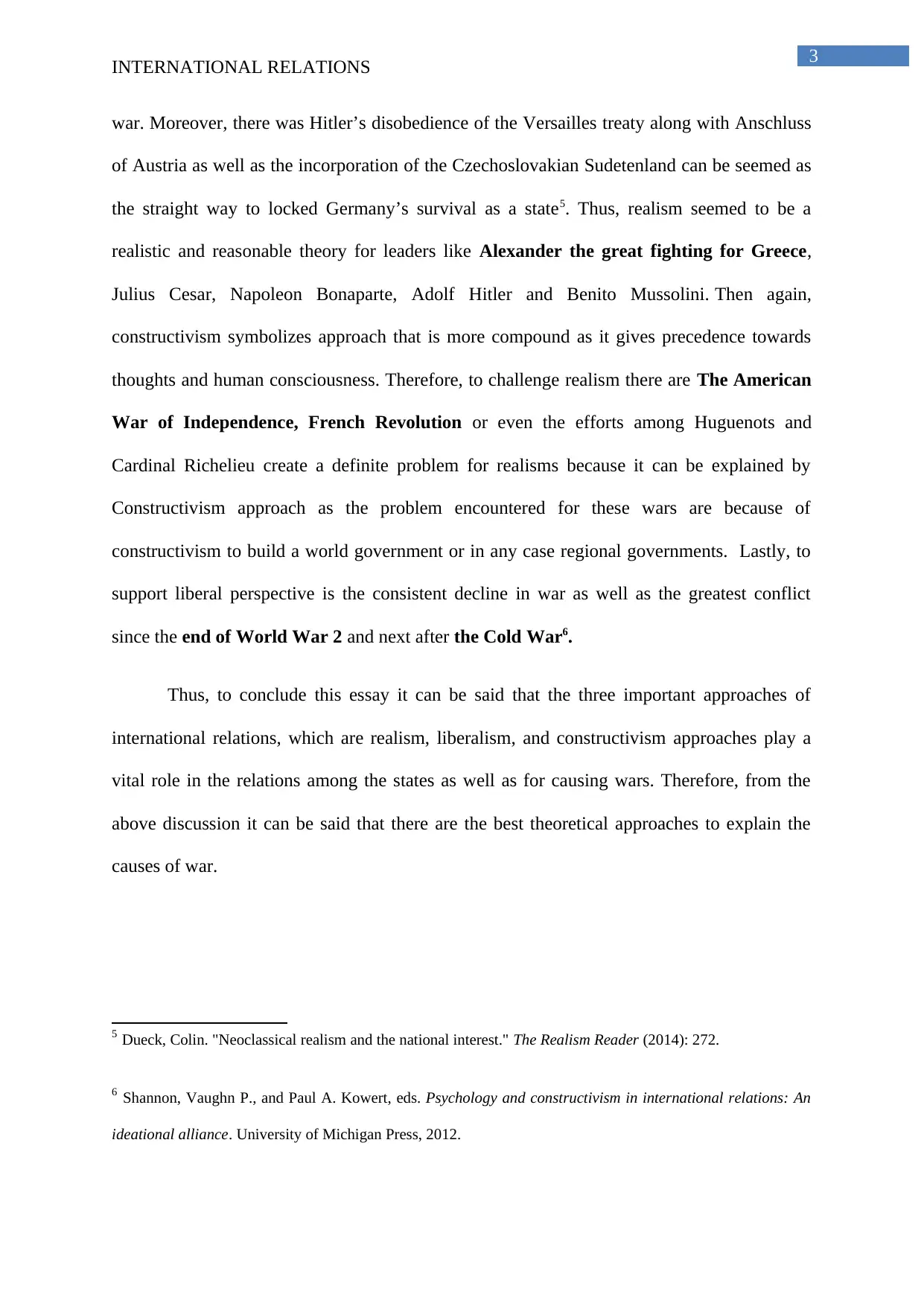
3
INTERNATIONAL RELATIONS
war. Moreover, there was Hitler’s disobedience of the Versailles treaty along with Anschluss
of Austria as well as the incorporation of the Czechoslovakian Sudetenland can be seemed as
the straight way to locked Germany’s survival as a state5. Thus, realism seemed to be a
realistic and reasonable theory for leaders like Alexander the great fighting for Greece,
Julius Cesar, Napoleon Bonaparte, Adolf Hitler and Benito Mussolini. Then again,
constructivism symbolizes approach that is more compound as it gives precedence towards
thoughts and human consciousness. Therefore, to challenge realism there are The American
War of Independence, French Revolution or even the efforts among Huguenots and
Cardinal Richelieu create a definite problem for realisms because it can be explained by
Constructivism approach as the problem encountered for these wars are because of
constructivism to build a world government or in any case regional governments. Lastly, to
support liberal perspective is the consistent decline in war as well as the greatest conflict
since the end of World War 2 and next after the Cold War6.
Thus, to conclude this essay it can be said that the three important approaches of
international relations, which are realism, liberalism, and constructivism approaches play a
vital role in the relations among the states as well as for causing wars. Therefore, from the
above discussion it can be said that there are the best theoretical approaches to explain the
causes of war.
5 Dueck, Colin. "Neoclassical realism and the national interest." The Realism Reader (2014): 272.
6 Shannon, Vaughn P., and Paul A. Kowert, eds. Psychology and constructivism in international relations: An
ideational alliance. University of Michigan Press, 2012.
INTERNATIONAL RELATIONS
war. Moreover, there was Hitler’s disobedience of the Versailles treaty along with Anschluss
of Austria as well as the incorporation of the Czechoslovakian Sudetenland can be seemed as
the straight way to locked Germany’s survival as a state5. Thus, realism seemed to be a
realistic and reasonable theory for leaders like Alexander the great fighting for Greece,
Julius Cesar, Napoleon Bonaparte, Adolf Hitler and Benito Mussolini. Then again,
constructivism symbolizes approach that is more compound as it gives precedence towards
thoughts and human consciousness. Therefore, to challenge realism there are The American
War of Independence, French Revolution or even the efforts among Huguenots and
Cardinal Richelieu create a definite problem for realisms because it can be explained by
Constructivism approach as the problem encountered for these wars are because of
constructivism to build a world government or in any case regional governments. Lastly, to
support liberal perspective is the consistent decline in war as well as the greatest conflict
since the end of World War 2 and next after the Cold War6.
Thus, to conclude this essay it can be said that the three important approaches of
international relations, which are realism, liberalism, and constructivism approaches play a
vital role in the relations among the states as well as for causing wars. Therefore, from the
above discussion it can be said that there are the best theoretical approaches to explain the
causes of war.
5 Dueck, Colin. "Neoclassical realism and the national interest." The Realism Reader (2014): 272.
6 Shannon, Vaughn P., and Paul A. Kowert, eds. Psychology and constructivism in international relations: An
ideational alliance. University of Michigan Press, 2012.
Secure Best Marks with AI Grader
Need help grading? Try our AI Grader for instant feedback on your assignments.
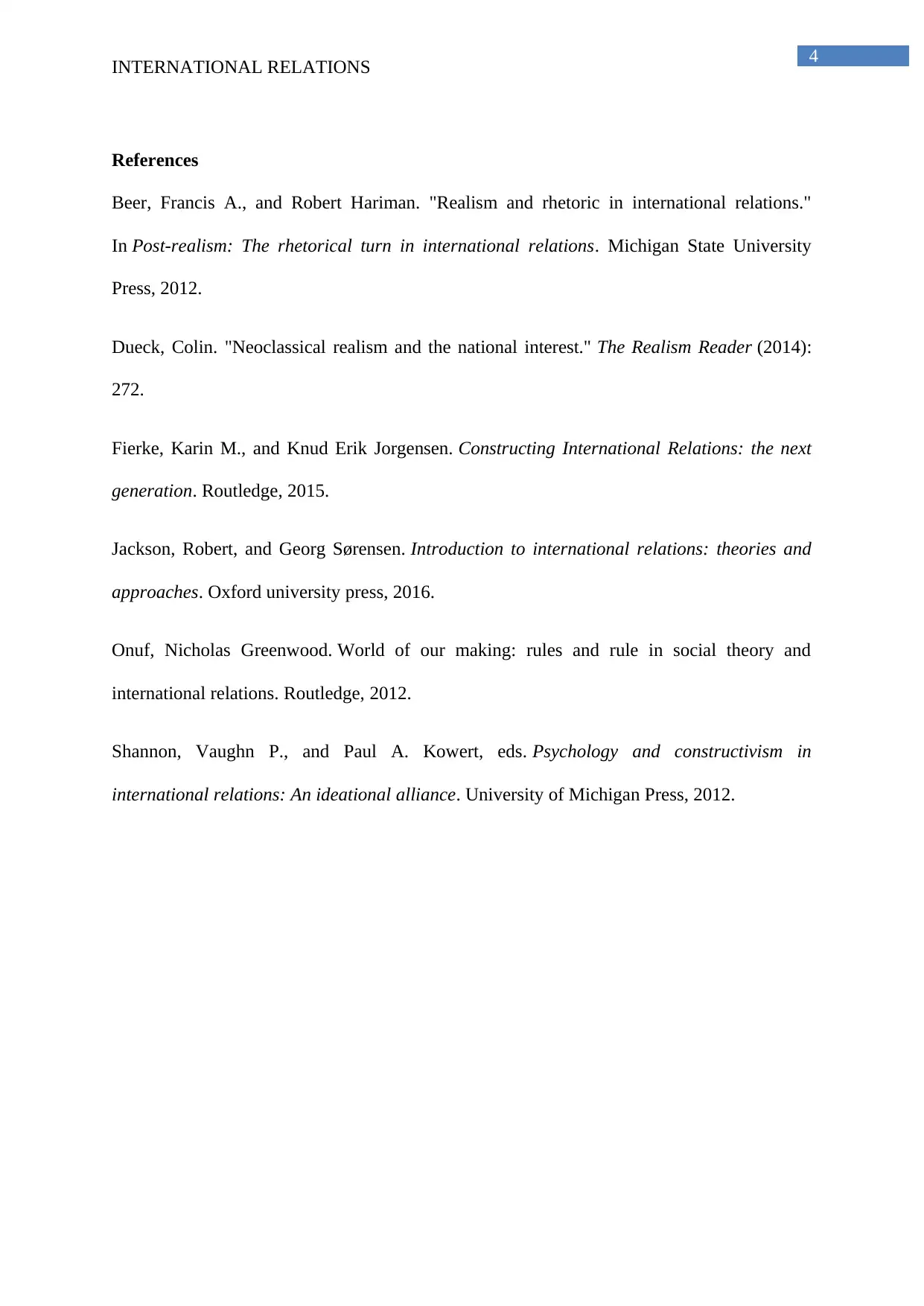
4
INTERNATIONAL RELATIONS
References
Beer, Francis A., and Robert Hariman. "Realism and rhetoric in international relations."
In Post-realism: The rhetorical turn in international relations. Michigan State University
Press, 2012.
Dueck, Colin. "Neoclassical realism and the national interest." The Realism Reader (2014):
272.
Fierke, Karin M., and Knud Erik Jorgensen. Constructing International Relations: the next
generation. Routledge, 2015.
Jackson, Robert, and Georg Sørensen. Introduction to international relations: theories and
approaches. Oxford university press, 2016.
Onuf, Nicholas Greenwood. World of our making: rules and rule in social theory and
international relations. Routledge, 2012.
Shannon, Vaughn P., and Paul A. Kowert, eds. Psychology and constructivism in
international relations: An ideational alliance. University of Michigan Press, 2012.
INTERNATIONAL RELATIONS
References
Beer, Francis A., and Robert Hariman. "Realism and rhetoric in international relations."
In Post-realism: The rhetorical turn in international relations. Michigan State University
Press, 2012.
Dueck, Colin. "Neoclassical realism and the national interest." The Realism Reader (2014):
272.
Fierke, Karin M., and Knud Erik Jorgensen. Constructing International Relations: the next
generation. Routledge, 2015.
Jackson, Robert, and Georg Sørensen. Introduction to international relations: theories and
approaches. Oxford university press, 2016.
Onuf, Nicholas Greenwood. World of our making: rules and rule in social theory and
international relations. Routledge, 2012.
Shannon, Vaughn P., and Paul A. Kowert, eds. Psychology and constructivism in
international relations: An ideational alliance. University of Michigan Press, 2012.
1 out of 5
Your All-in-One AI-Powered Toolkit for Academic Success.
+13062052269
info@desklib.com
Available 24*7 on WhatsApp / Email
![[object Object]](/_next/static/media/star-bottom.7253800d.svg)
Unlock your academic potential
© 2024 | Zucol Services PVT LTD | All rights reserved.

